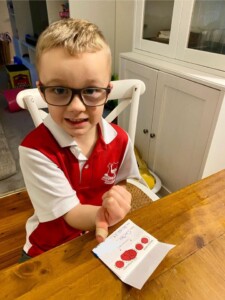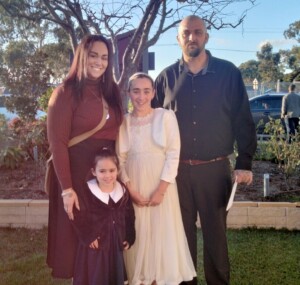Type1Screen: Screening for early-stage type 1 diabetes in family members
JDRF Australia funds a program where family members of those with type 1 diabetes (T1D) can be screened for the early stages of the condition. Identifying if someone is in the early stages of T1D can bring about long-term health benefits.
We previously thought that T1D starts shortly before (or when) people show the 4T symptoms: thirst, toilet (frequent urination), thinness and tiredness. But decades of research have discovered that there are several detectable changes in people before these symptoms develop. These changes can occur months or even years before diagnosis typically occurs. People in these stages have ‘early-stage’ or ‘pre-symptomatic’ T1D and can be easily identified with a blood test. Read more about the stages of T1D here.
JDRF funds Type1Screen which provides free screening to family members of those diagnosed with T1D to test whether they are in the early stages of the condition. Screening family members is important as they are at increased risk of developing T1D when compared to the general population.
The Type1Screen program has already screened over 1,000 people and is looking for more family members who may benefit.
What’s involved in screening for T1D?
Detecting the early stages of T1D involves a simple blood test. This can be done at home using a fingerpick test where five drops of blood are put on a card. The card is sent to a lab in Melbourne where the blood is analysed for the presence of islet autoantibodies. These are markers of early-stage T1D. Read more about autoantibodies here.
If the test is positive for autoantibodies, a venous blood test (needle in the arm) is required to confirm the findings. If confirmed, you will be put in contact with the closest participating diabetes centre for education and follow-up. You will also be offered opportunities to participate in clinical trials that aim to prevent or delay the onset of Stage 3 T1D. Current T1D clinical trials and studies recruiting in Australia can be found on our clinical trial page.

Carter, doing his own Type1Screen… it’s that easy
Benefits of screening
Screening for early-stage T1D has many benefits to both the person and their family. These include:
- Reducing the trauma of diagnosis: By picking up T1D early, we can better support families so that the transition to treatment is less sudden and stressful
- Reducing diabetic ketoacidosis at diagnosis: detection of early-stage T1D, combined with monitoring and education, can significantly reduce the rate of developing a dangerous condition called diabetic ketoacidosis (DKA). Left untreated, DKA can be fatal. DKA at diagnosis of T1D is also linked with worse long-term health effects, so preventing it from happening is important.
- Opportunities to test therapies to delay or prevent the condition: Identifying people in early-stage T1D enables them the opportunity to participate in trials testing therapies to slow down the progression of T1D. In future, when these therapies become available, screening for early-stage T1D will allow us to offer them to those who will most benefit from the treatment.
Am I eligible?
People who are eligible for screening under Type1Screen must be:
- aged over 2 years
- live in Australia
- have a relative diagnosed with T1D or have previously tested positive for an islet antibody test.
Where can I find more information?
You can find more information on the Type1Screen website, Facebook, Instagram or by contacting the Type1Screen team by phone on 03 9342 7063 or email Type1Screen@mh.org.au
More information can also be found on the Type1Screen FAQs.
JDRF’s role in supporting screening for T1D
JDRF is committed to a world without T1D. That’s why we fund research projects which will ultimately prevent people from reaching clinical T1D (Stage 3 T1D). We fund two screening projects under the JDRF Type 1 Diabetes Clinical Research Network (CRN): Type1Screen and the Type 1 Diabetes National Screening Pilot. Type1Screen has been supported by the CRN since 2019.
One family’s story of Type1Screen

“On a mission to help my partner Mathew (diagnosed at 26) better manage his own type 1 diabetes, I stumbled across Type1Screen. I didn’t hesitate to register our daughters Alyssia (10) and Chelsea (5). I had my suspicions about Alyssia, so when we received a phone call from the Type1Screen team I wasn’t surprised. She had tested positive for the antibodies.
On March 16 bloods were taken and a glucose test was done to confirm her levels. On March 18 she was clinically diagnosed with type 1 diabetes at the Royal Children’s Hospital.
As upsetting as it was to find out Alyssia had type 1 like her dad, we are extremely happy it happened the way it did. Thanks to Type1Screen Alyssia presented to the hospital as a healthy happy kid when most start off in ICU, so for that we are honoured to have found Type1Screen. I’ve now arranged for Chelsea to be screened every 6 months.”
– Nicole, Mum to Alyssia and Chelsea
